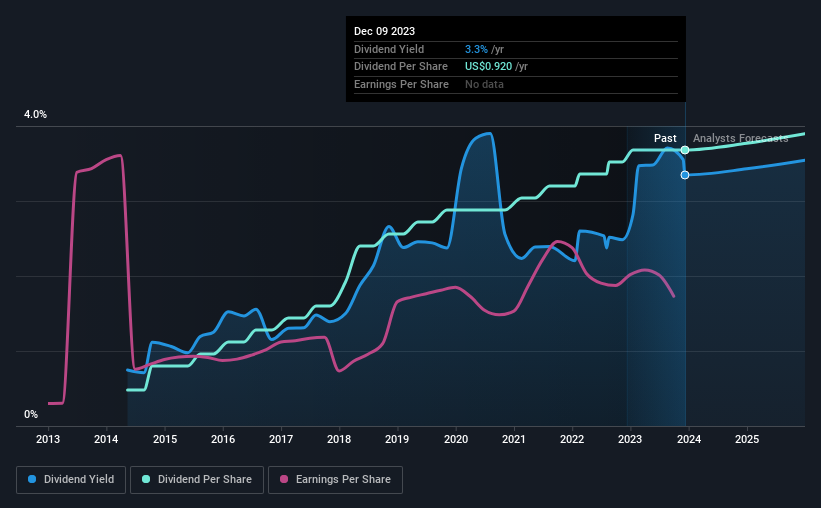United Community Banks, Inc. (NASDAQ:UCBI) Passed Our Checks, And It's About To Pay A US$0.23 Dividend
It looks like United Community Banks, Inc. (NASDAQ:UCBI) is about to go ex-dividend in the next 4 days. The ex-dividend date occurs one day before the record date which is the day on which shareholders need to be on the company's books in order to receive a dividend. It is important to be aware of the ex-dividend date because any trade on the stock needs to have been settled on or before the record date. Accordingly, United Community Banks investors that purchase the stock on or after the 14th of December will not receive the dividend, which will be paid on the 5th of January.
The company's next dividend payment will be US$0.23 per share. Last year, in total, the company distributed US$0.92 to shareholders. Calculating the last year's worth of payments shows that United Community Banks has a trailing yield of 3.3% on the current share price of $27.49. Dividends are an important source of income to many shareholders, but the health of the business is crucial to maintaining those dividends. As a result, readers should always check whether United Community Banks has been able to grow its dividends, or if the dividend might be cut.
See our latest analysis for United Community Banks
Dividends are typically paid out of company income, so if a company pays out more than it earned, its dividend is usually at a higher risk of being cut. Fortunately United Community Banks's payout ratio is modest, at just 42% of profit.
Generally speaking, the lower a company's payout ratios, the more resilient its dividend usually is.
Click here to see the company's payout ratio, plus analyst estimates of its future dividends.
Have Earnings And Dividends Been Growing?
Companies with consistently growing earnings per share generally make the best dividend stocks, as they usually find it easier to grow dividends per share. If business enters a downturn and the dividend is cut, the company could see its value fall precipitously. Fortunately for readers, United Community Banks's earnings per share have been growing at 18% a year for the past five years.
Many investors will assess a company's dividend performance by evaluating how much the dividend payments have changed over time. Since the start of our data, nine years ago, United Community Banks has lifted its dividend by approximately 25% a year on average. Both per-share earnings and dividends have both been growing rapidly in recent times, which is great to see.
To Sum It Up
Is United Community Banks worth buying for its dividend? When companies are growing rapidly and retaining a majority of the profits within the business, it's usually a sign that reinvesting earnings creates more value than paying dividends to shareholders. Perhaps even more importantly - this can sometimes signal management is focused on the long term future of the business. Overall, United Community Banks looks like a promising dividend stock in this analysis, and we think it would be worth investigating further.
In light of that, while United Community Banks has an appealing dividend, it's worth knowing the risks involved with this stock. In terms of investment risks, we've identified 2 warning signs with United Community Banks and understanding them should be part of your investment process.
Generally, we wouldn't recommend just buying the first dividend stock you see. Here's a curated list of interesting stocks that are strong dividend payers.
Have feedback on this article? Concerned about the content? Get in touch with us directly. Alternatively, email editorial-team (at) simplywallst.com.
This article by Simply Wall St is general in nature. We provide commentary based on historical data and analyst forecasts only using an unbiased methodology and our articles are not intended to be financial advice. It does not constitute a recommendation to buy or sell any stock, and does not take account of your objectives, or your financial situation. We aim to bring you long-term focused analysis driven by fundamental data. Note that our analysis may not factor in the latest price-sensitive company announcements or qualitative material. Simply Wall St has no position in any stocks mentioned.

